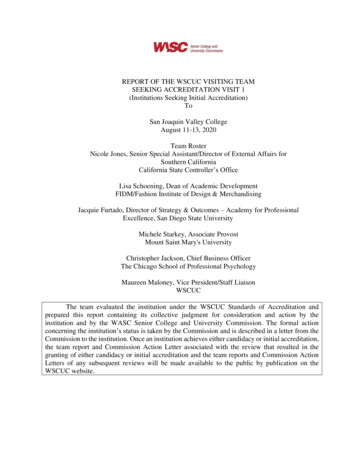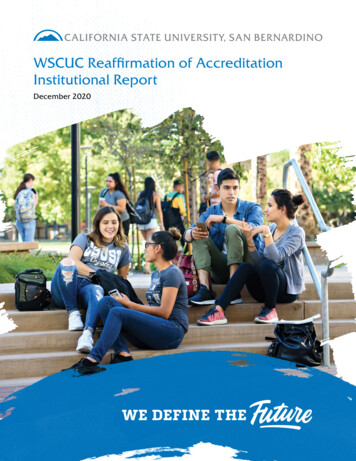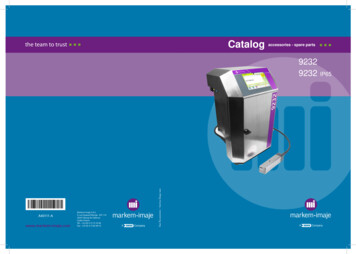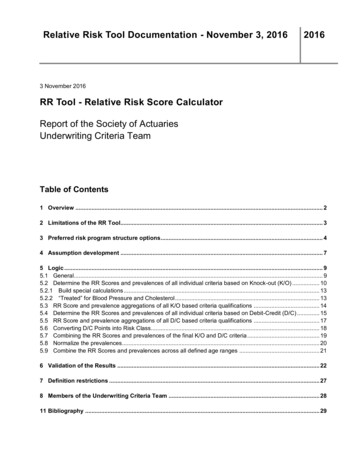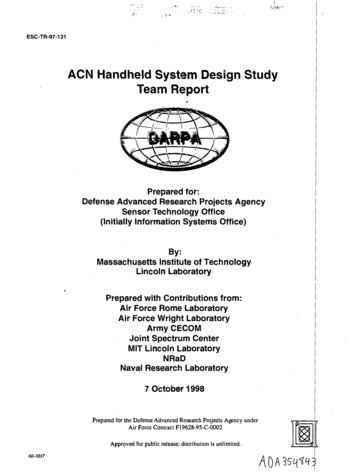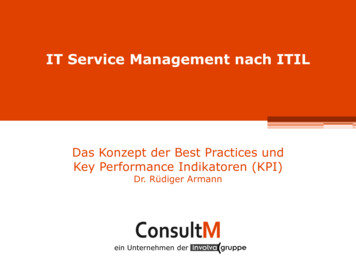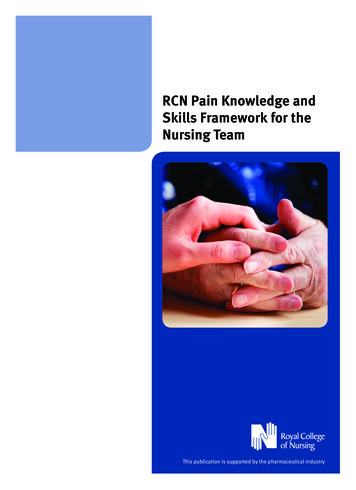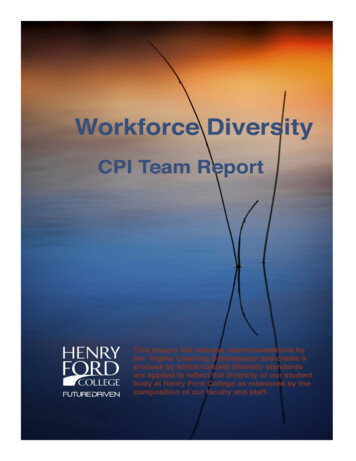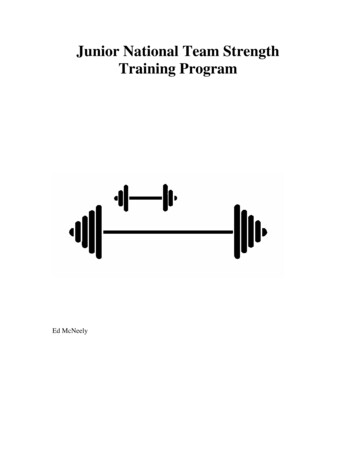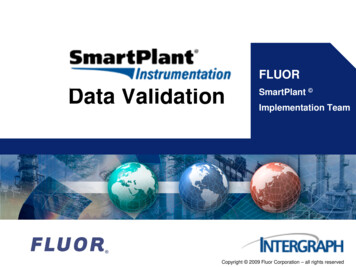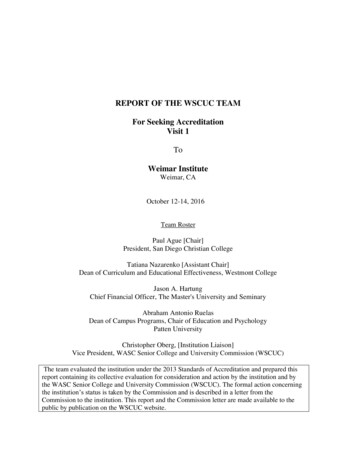
Transcription
REPORT OF THE WSCUC TEAMFor Seeking AccreditationVisit 1ToWeimar InstituteWeimar, CAOctober 12-14, 2016Team RosterPaul Ague [Chair]President, San Diego Christian CollegeTatiana Nazarenko [Assistant Chair]Dean of Curriculum and Educational Effectiveness, Westmont CollegeJason A. HartungChief Financial Officer, The Master's University and SeminaryAbraham Antonio RuelasDean of Campus Programs, Chair of Education and PsychologyPatten UniversityChristopher Oberg, [Institution Liaison]Vice President, WASC Senior College and University Commission (WSCUC)The team evaluated the institution under the 2013 Standards of Accreditation and prepared thisreport containing its collective evaluation for consideration and action by the institution and bythe WASC Senior College and University Commission (WSCUC). The formal action concerningthe institution’s status is taken by the Commission and is described in a letter from theCommission to the institution. This report and the Commission letter are made available to thepublic by publication on the WSCUC website.
TABLE OF CONTENTSSECTION I – OVERVIEW AND CONTEXT.2A. Description of the Institution and Visit. 2B. Quality and Rigor of Institutional Report. 3C. Response to Issues Raised in the Eligibility Review Committee Letter. 4SECTION II – EVALUATION OF COMPLIANCE WITH WSCUC’SSTANDARDS. . 9Standard 1: Defining Institutional Purposes and Ensuring Educational Objectives .Standard 2: Achieving Educational Objectives through Core Functions.Standard 3: Developing and Applying Resources and Organizational Structures to EnsureQuality and Sustainability.Standard 4: Creating an Organization Committed to Quality Assurance, InstitutionalLearning and Improvement.9131926SECTION III – PREPARATION FOR ACCREDITATION UNDER THE 2013HANDBOOK OF ACCREDITATION . . 31A. Degrees Programs: Meaning, Quality, and Integrity of Degrees 31B. Educational Quality: Core Competencies, and Standards of Performance atGraduation . 31C. Sustainability: Preparing for the Changing Higher Education Environment . 32SECTION IV – INVENTORY OF EDUCATIONAL EFFECTIVENESSINDICATORS. 32SECTION V – FINDINGS, RECOMMENDATIONS, AND COMMENDATIONS 33APPENDICES. 35A. Credit Hour Review Report.B. Marketing and Recruitment Review Report .C. Student Complaint Review Report.D. Transfer Policy Review Report.Team Report of Seeking WSCUC Accreditation Visit 1: Weimar Institute35363738Page 1
SECTION I – OVERVIEW AND CONTEXTA. Description of the Institution and VisitWeimar Institute is a private, non-profit, co-educational, self-supporting Seventh-day AdventistCollege offering an associate’s degree in Nursing and bachelor’s degrees in Natural Sciences(BS), Religion (BA), Christian Education (BA), and General Studies (BA/BS). It also offerscertificates in Health Evangelism and Leadership Training, HEALTH Medical Assistant, andAdvanced Massage and Hydrotherapy. The Institute anticipates expanding its four-year degreeofferings to include Nursing, Psychology, Business Administration, and Music within the nextfive years. Its mission statement is: “To follow Jesus by developing leaders in comprehensivehealth evangelism through competent modeling and education, in both theory and practice.”Weimar Institute was established in 1978 in connection with NEWSTART (an acronymfor nutrition, exercise, water, sunshine, temperance, fresh air, rest, and trust in Divine Power), asanitarium located in Weimar, California. It was closed briefly in 2008, but reopened in 2009under new leadership. Weimar currently enrolls 90 students and employs 24 teaching staff and80 non-teaching personnel.Weimar applied for Eligibility under the name of Weimar College with the purpose ofobtaining WSCUC accreditation for the institution and its academic programs in October of2012. The first review was conducted by WSCUC Eligibility Review Committee (ERC) onOctober 9, 2012, and Eligibility was declined. In March of 2014, the college reapplied forEligibility under the name of Weimar Institute and in October 2014 Eligibility was granted untilOctober 2019 with specific recommendations on certain criteria. In March 2016, WeimarInstitute submitted a Letter of Intent to Apply for Accreditation and in August 2016 – itTeam Report of Seeking WSCUC Accreditation Visit 1: Weimar InstitutePage 2
submitted a Seeking Accreditation Institutional Report (Visit I). The WSCUC team onsite visittook place on October 12-14, 2016.B. Quality and Rigor of Institutional ReportOverall, the institutional report submitted in preparation for the fall 2016 SAV1 is adequatelywritten and accurately portrays the condition of the institution and the assessment process it hasundertaken for the review. The report documents a spectrum of substantive engagement with thekey issues identified in the letter granting eligibility by the Eligibility Review Committee. It alsoacknowledges the strengths and weaknesses the institution discovered through the self-studyprocess. To support compliance assertions to the WSCUC criteria for review, Weimar providedbackup documentation that was accessible to the team. The additional information requestedprior to and during the site visit was provided without delay by the ALO and Director ofInstitutional Research. This and the observations obtained onsite helped the team understand theprogress the institution has made since approval of the Eligibility Action Letter.The team found that the Board of Trustees, President, Chief Academic Officer, ChiefFinancial Officer, faculty, staff, students, and alumni were all involved in conducting the selfreview. Weimar Institute created four Standard Teams to focus on each of the four WSCUCAccreditation Standards and associated CFRs; each Standard Team had broad representationfrom faculty and staff and met regularly to address findings, evaluate progress, and make plansfor improvements. The institution used the process of the self-review for developing appropriatemethodology of evaluating the quality of its programs and student learning. The report includeda synthesis and reflections at the end of each Standard section, and two or three of the mostimportant issues emphasized under that Standard were addressed. Areas of strength andTeam Report of Seeking WSCUC Accreditation Visit 1: Weimar InstitutePage 3
improvement were also included, which attests to the institution’s greater understanding of itseffectiveness and system of quality control in higher education. However, given that Weimar’sassessment and program review efforts are fairly new, the team found that available educationaleffectiveness data is limited in most areas of inquiry. The Vice President for Academic Affairs,who also serves as ALO, and the Director of Institutional Research led the preparation processfor the institutional reports.While the institutional reports established the foundation for the campus visit, the onsiteinterviews and discussions with a cross section of stakeholders provided the additionalinformation needed to answer outstanding questions and inform the team’s findings. During thesite visit, the visiting team found that the board members, administrators, faculty, staff, andstudents are deeply committed to the Weimar mission, vision, and goals. All interviewed keystakeholders demonstrated widespread knowledge of the institute’s educational effectivenessprocesses, Institutional and Program Student Learning Outcomes (ISLOs/PSLOs), the report, andthe visit.The team would like to acknowledge the Weimar community’s engagement in theaccreditation process and the amount of time, effort, and energy it has invested in the process.The team would also like to express its appreciation to the community for the openness withwhich they responded to questions and the provision of additional materials as requested as wellas for their effort in making the site visit hospitable.C. Response to Issues Raised in the Eligibility Review Committee LetterWeimar Institute’s Letter of Intent to Apply for Accreditation consisted of five sections: 1)addressing previous areas of concern; 2) preparing for the SAV1; 3) outcomes of the reviewTeam Report of Seeking WSCUC Accreditation Visit 1: Weimar InstitutePage 4
process; 4) changes in leadership, ownership or governance; 4) attachments (financial documentsand stipulation). The team found that the institution was able to demonstrate that it had madeefforts in all of the areas of recommendation and concern raised in the Eligibility ReviewCommittee’s letter granting eligibility. Most of the issues appear to have been addressedsatisfactorily. Below is the summary of the institute’s responses to the Committee’srecommendations and concerns.Criterion 1. Authority. Maintaining diligence working with the Bureau for PrivatePostsecondary Education (BPPE)The BPPE approved Weimar Institute’s Approval to Operate and Offer Educational Programs forNon-Accredited Institutions renewal application on July 15, 2015, and approved the Applicationfor Change in Educational Objectives to reflect the Institute’s current program offerings onSeptember 25, 2015. Most recently, the Institute submitted an accreditation status report to theBPPE showing that it has satisfied the “pre-accreditation” requirement mandated by theCalifornia Private Postsecondary Education Act of 2009. The BPPE will empanel a visitingcommittee prior to July 1, 2017 to review the progress of Weimar Institute in seeking WSCUCaccreditation.Criterion 2. Integrity: Purpose. Articulating Weimar’s mission in a manner thatcommunicates the centrality of the academic mission within the history and culture of theinstitutionThe mission statement was reworked to be both comprehensive and measurable. It was restatedas follows: "To follow Jesus by developing leaders in comprehensive health evangelism throughcompetent modeling and education, in both theory and practice.”Team Report of Seeking WSCUC Accreditation Visit 1: Weimar InstitutePage 5
Criterion 4. Governing Board. Continuing Weimar’s Board of Trustee developmentThe Board of Trustees was expanded by adding board members with research doctorate degreesand appropriate expertise; however Weimar may consider adding an additional member with anacademic or business background.Criterion 5. Chief Executive Officer. Being able to demonstrate how Weimar meets thisCriterion in the context of the development of the institutionThe President, Dr. Neil Nedley, has closed his medical practice in Oklahoma and is working fulltime as CEO of Weimar Institute. He maintains a medical license in California by working 1/2day a week, seeing outpatients, and 4 days per month (some week-end days) as a part-timehospitalist for Sutter Auburn Faith hospital. He resides in Colfax, CA, 12 miles from WeimarInstitute.Criterion 10. Educational Objectives and Student Learning. Identifying rubrics and otherforms of assessment for such objectives as character buildingAssessment Director, Dr. Christina Harris, spearheaded the process of developing institutionaland program student learning outcomes (ISLOs and PSLOs), as well as associated rubrics basedon the AAC&U VALUE rubrics. Subsequently, signature assignments and expected levels ofstudent performance were identified for each program.Criterion 13. General Education. Continuing the refinement of the GE programThe General Education department performed a program assessment of Institutional StudentLearning Outcome #1 (Spiritual Leaders) following fall semester 2015. The General Educationchair is presently re-examining the courses within the program. The aim is to employ a newTeam Report of Seeking WSCUC Accreditation Visit 1: Weimar InstitutePage 6
paradigm that is in alignment with the Institute’s vision and mission beginning the academic yearof 2016-17 for all new student accessions.Criterion 15. Student Services. Addressing statements of non-discrimination and a process forstudent complaints/appealsThe College Council approved a statement of Non-Discrimination on December 2, 2015. Inaddition, the College Council also approved a process for complaints and appeals on July 15,2015. This policy and process are included in the Student Handbook and posted on theinstitutional website.Criterion 17. Information and Learning Resources. Expanding and enhancing theinformation resources in response to growth in student resourcesIn early 2015, Weimar Institute expanded its offerings of online, peer-reviewed journals toinclude EBSCO’s Academic Search and CINAHL. It also hired a Library Manager, whooversees the day-to-day library operations. Additionally, a consultant was hired to developrecommendations for expanding library resources necessary to meet current and future students’needs. The consultant’s report will be used for developing an action plan and a timeline for itsimplementation. Moreover, the General Education program is currently undergoing a review,which includes addressing the integration of information literacy in the curriculum.Criterion 18. Financial Resources. Documenting how the institution’s enrollment andfinancial plans have matured with the overall planning of the institutionThe Enrollment Management Committee, composed of representatives from Student Services,Student Success, Admissions, Registration, Recruitment, and Weimar academic administration,Team Report of Seeking WSCUC Accreditation Visit 1: Weimar InstitutePage 7
was formed in September of 2015. The Committee conducted focus groups and surveys at theend of 2015 and the beginning of 2016 to assess current enrollment related efforts. Thecommittee is currently working on a three-year strategic enrollment management plan to increaseenrollment, improve student retention, and enhance Weimar Institute’s marketing efforts.Weimar’s current enrollment is 90 students (including 16 Nursing students).Weimar Institute has achieved a balanced budget for the past 4 fiscal years. Donations toWeimar Institute are at their highest level ever totaling 1.6 million during the last fiscal yearand 2.1 million for the current fiscal year. Since 2014, Weimar has booked over 2,000,000 inbuilding assets. This includes Haskell Hall, Academy classroom expansions, multiple buildingimprovements, a clinic remodel, and extensive road and parking lot improvements.The Institute is also aggressively seeking campus industries and services that would alsoenhance student learning objectives as well as generate income. These include, but are notlimited to: “microhomes” construction, on-campus vegan cafeteria and vegan food and foodsupply store, and hydrotherapy and massage services at NEWSTART for the surroundingcommunities. The institute has 457 acres of property and is considering the development of theorganic farm and timber operation.The Institute expects that with WSCUC accreditation, it will be easier to recruit andretain students, which will lead to an overall financial improvement.Criterion 20. Institutional Planning. Referencing Weimar’s progress and challenges inimplementing the institutional plan, and demonstrating the integration of financial andinstitutional plansTeam Report of Seeking WSCUC Accreditation Visit 1: Weimar InstitutePage 8
Weimar Institute conducted institutional planning in the spring of 2015 and is moving forwardwith implementation, such that financial matters are included in operational and tacticalexecution.Criterion 21. Institutional Evaluation and Assessment of Student Learning. Furtheringinstitutional evaluation and assessment effortsIn addition to the response to Criterion 10, Weimar Institute contracted with Chalk&Wire, acloud-based assessment management system (AMS), to address its assessment reporting needs.The AMS was piloted during the 2015-16 academic year for the Natural Science programreview. During the review process, the Institute found that Chalk&Wire was not well suited tomeet the need. In this light, in summer of 2016 the Educational Effectiveness Committee votedto discontinue the use of C&W and utilize Excel in its place.SECTION II – EVALUATION OF INSTITUTIONAL COMPLIANCE WITH WSCUC’SSTANDARDSStandard 1: Defining Institutional Purposes and Ensuring Educational ObjectivesCFR 1.1 Formally approved, appropriate statements of purpose that define values andcharacterWeimar has a defined mission and values that are closely related to its educational purpose. Themission states that Weimar’s desire is to “Follow Jesus by developing leaders in comprehensivehealth evangelism through competent modeling and education, in both theory and practice.” Theadministration, faculty, staff, and students gave a clear understanding of this mission anddemonstrated a deep commitment to the mission and values. If the institution plans to extend itsTeam Report of Seeking WSCUC Accreditation Visit 1: Weimar InstitutePage 9
academic programs to include other areas of service such as business, music, psychology, as wellas a Nursing BSN, it is suggested that Weimar review the mission and values to incorporate thelearning outcomes for these expanded program offerings.CFR 1.2 Clear educational objectives; indicators of student achievement at institution,program and course levels; retention/graduation data and evidence of student learning madepublicRecently, Weimar supported an intensive effort to ensure the institution has clear learningoutcomes at all three levels—institutional, program (both academic and co-curricular), andcourse. A strong pictorial graph was provided to demonstrate how all learning outcomes worktoward the accomplishment of Weimar’s vision, mission, and values. There have been significantsteps developed to assess the institutional, program, and course student learning outcomes toensure student learning can be qualified and quantified. However, this practice is still at itsemerging stage and needs time to be strengthened and mature in order to provide the necessarydata to close the feedback loop and demonstrate continuous improvement with both internal andexternal student learning benchmarks. The team advises the institution to continue collecting,analyzing, and using the data and metrics from the assessment practices for decision-making atall levels to ensure successful student learning.CFR 1.3 Academic freedom: policies and practicesWeimar demonstrated the beginning of an academic freedom policy for faculty and studentsand it can be found in the appropriate handbooks. The policy is described in the context ofWeimar’s worldview and Christian beliefs. It provides a standard for excellence and scholarlyTeam Report of Seeking WSCUC Accreditation Visit 1: Weimar InstitutePage 10
work rather than a policy statement on academic freedom. The institution should considerreviewing its academic freedom policy by faculty governance.CFR 1.4 Diversity: policies, programs, and practi
Patten University Christopher Oberg, [Institution Liaison] Vice President, WASC Senior College and University Commission (WSCUC) The team evaluated the institution under the 2013 Standards of Accreditation and prepared this report containing its collective evaluati
